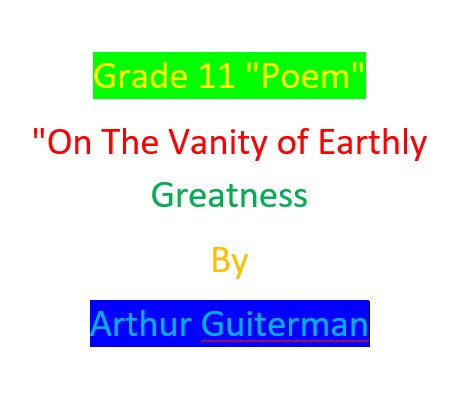Point to understand
• He says that it
is futile to be proud of worldly greatness.
• He talks about
vanity of human greatness.
• Everything in
the world perishable.
•The great and
powerful persons and object will be worthless and useless.
• In the passage
of time, powerful, great, brave person becomes the subject to worthlessness.
• Nothing is
stable and constant in the world.
• Our sense of greatness
is momentary.
• Even the great
emperor becomes worthless in the passage of time.
• Powerful time
has brought many changes in the world.
• In front of
time, the worldly things and powerful people become useless and worthless.
• The powerful
tusk of mastodons has become just the playthings.
• The shining
sword of great emperor, Charlemagne, has been rusted.
• The terrible
grizzly bear of the past has now been turned into a mere rug.
• The great Roman
emperor Julius Caesar has now been kept into the shelf as an object of decoration.
• The powerful
people come and go in the course of time.
Summary
In “On the Vanity of Earthly
Greatness”, the poet describes the changes the powerful time has brought to
different people and objects. The tusks of mastodons that fought powerful fights
in the past have now become just the playthings. The shining sword of the brave
warrior and Emperor Charlemagne has now been rusted. The fearful grizzly bear
of the past has now been turned into a mere rug. The powerful and great Roman
General Julius Caesar has now been confined into a shelf as an object of
decoration. This shows that the power and greatness of today will be worthless in the future. Realizing this fact, the poet
also seems worried.
This poem makes us realize the
remorselessness of time and the vanity of human greatness. We generally do not
think that the great and powerful persons and objects will turn to be worthless
one day. Most people in the world are proud of their greatness, power and
possessions which are actually futile. With the passage of time, every
powerful, great, Honorable, precious and beautiful object or being becomes the
subject of death, decay, ugliness and
worthlessness. Nothing is constant and everlasting on earth. Everything is
changeable and subject it death and decay. Every one of us will die either
sooner or later. The powerful wheel of time turns everything's into the
worthless dust. The greatness, honour preciousness, power, achievements, beauty,
adventures etc. are momentary. With the passage of time, they all turn to be
futile, meaningless, and worthless and trifle. Thus, the poem is ironical. The
unawareness of the human beings about the vanity of earthly greatness is
portrayed through irony.
1.Summaries the poem "On
the Vanity of Earthly Greatness" on one Sentence.
Or, Write the main/ central
idea or theme of the poem in one sentence.
Or, Write a summary of the
poem 'On the Vanity Of Earthly Greatness'.
· As the tusk of the powerful
mastodons brave become just the playthings; the shining sword of brave emperor
Charlemagne have now rusted; the fearful grizzly bear has turned into a rug and
the great Roman General Caesar's bust is on the shelf, similarly, all the
greatness of human begins and animals become worthless with the passage of
time.
2. What changes to people and
objects are described in the poem "On the Vanity of Earthly
Greatness"?
Or, What is Vanity involved
in the poem "On the vanity of Earthly Greatness"?
·
In "On the vanity of
Earthly Greatness", the poet describes the changes the powerful time has
bought to different people and objects. The tusks of mastodons that fought
powerful fights in the past have now become just the playthings. The shining
sword of brave warrior an emperor Charlemagne has now rusted. The awful grizzly
bear of the past has now been turned into a rug. The powerful and great Roman
General Caesar is now confined into a shelf. This makes us realise the remorselessness
of time and the vanity of human greatness. Every powerful being or thing
becomes worthless with the passage of time.
3. What four things does the
poet mention in the poem "Vanity of Earthly Greatness"?
·The four things poet
mentions in the poem "Vanity Greatness" are as follow:
i)The tusk of the powerful
mastodons has become just the play things.
ii)The shining sword of
Charlemagne has now rusted.
iii) The fearful grizzly bear has
turned into a rug.
iv) The Greek Roman General
Caesar's bust is on the self as decorative things.
4. What are the different
Example used by the poet to show the vanity of earthly greatness?
·
The different example used
by the poet to show the vanity of early greatness and mastodons' tusks, the
sword of Charlemagne the just, the grizzly bear's hug and fame of Julius
Caesar. These things lost their value immediately after the death of concerned
people.
5. How is human vanity laughed
at in the poem "On the Vanity of Earthly Greatness"?
ü We generally do not think that the great and powerful person and object
will turn to be worthless, one day. Most people in the world are proud of their
greatness, power and possession which are actually futile. With the passage of time, the
powerful tusks of mastodons have become playthings and the mighty shining sword
of brave warrior and emperor Charlemagne has been rusted. The fearful grizzly
bear has turned to a mere rug and Julius Caesar's greatness and honour has been
confined into a shelf. Thus, the poem makes fun of the earthly greatness. They
are unaware of the fact that every powerful, great, honorable, rich and
beautiful object or being becomes the subject of death, decay, ugliness and
worthlessness. Thus, the poem is ironical.


No comments:
Post a Comment
Please do not enter any spam link in the comment box.